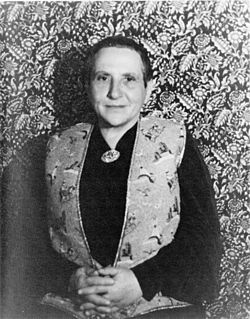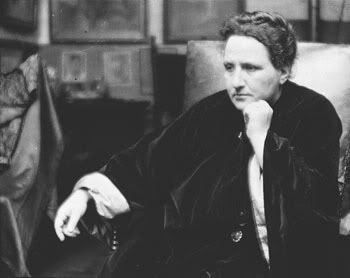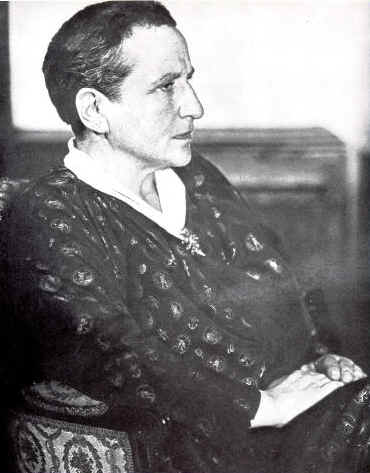
It Spoke America
by Will Hubbard
So I pick up a copy of Tender Buttons yesterday for $4.21; a slender volume, but a decent price nonetheless. Which speaks nothing of the breadth of poetic innovation here, considerable, considerable by no stretch of the imagination.

As another anniversary of the day the world changed forever passes forever from our minds once again, I thought it might be fun to take a look back at a book that changed the literary landscape of the world ipso facto without even trying. Picasso et al. were getting down to the basics, a still life was almost too much. Even an orange existed in time, peeling, peeled; there were Futurists living it up all over the continent, hardly responsible for their pets let alone for their children. Gertrude, having William James and a hardened beauty, wrote with abandon like the new painters were painting.

But more likely it was that they painted as she was writing. It will never be enough to say that there was a return to child-like impulses. Children do not make compositional choices, nor do they know what intuition is, nor do they have it. Children, for the most part, are just too fucking naive to notice all the hurtful shit around them, and rush into everything. That they sometimes succeed with unutterable grace is coincidence at its most base.

The intuition evidenced in Tender Buttons is magnanimous and wholly original because Stein had attentions far superior to any mere adult (or measly) child. She extended consciousness such that at her best she probably approximated the early IBMs in computational ability, seeing a complex of cognitive (read literary) pathways where a child could see none, an adult precisely one.
Williams sed: no ideas but in things. It was many years before that Gertrude Stein set about her task of giving birth to the English language. William James was a bit like an Henri Micheaux sans peyote, but even he could not have foreseen the voluble task ahead of a savior like Gertrude Stein. Whitman had written Emerson some fifty years previous to the effect that England was the language we were speaking in our literature even though it was only a minor island.

Everyone was pissed, especially Ezra Pound, but he was a lunatic and would not be recognized as such until later when he actually went crazy and became a Nazi. Then we, or more precisely Charles Olson and Robert Creeley, started to listen to him. But Pound would have listened to Tender Buttons long, long before. Because it spoke in the language of the New Continent. It spoke America.

Later on Stein come to revile nouns for the most part. It was often necessary to use pronouns but they were not quite as bad. This was when she was making the round on the lecture circuit, a sort of caged bear oddity act. Irony would have it that only at Oxford and Cambridge did they truly recognize the magnitude of her achievement; they literally wanted her over there all the time.
(Gertrude! Oh Gertrude!
Let us claim you for our own! Ease our fears of global obsolescence!
Et-ce-ter-aaaa!)
Fucking losers couldn't keep her. So over here we let her promenade around talking crazy at Harvard, at Yale, even down South they let her do the crazy talk retarded person schtick. But that it was the bounty of God, every word, the bounty of God.

And yes she returned to the more traditional style of Three Lives in later books, but it was with The Making of the Americans and more importantly, with Tender Buttons, that Gertrude Stein kicked England and really all literary academia in the nuts. And well, I must admit, this books remains a real ball-buster. You think it sucks when your social circumstances get tweaked, try to read a book that makes you feel like you're attending a religious service in proto-Indo-European. I tried to read it on the subway yesterday and almost puked.
Will Hubbard is the contributing editor to This Recording.

"Love Comes Back" - Arthur Russell (mp3)
"Planted a Thought" - Arthur Russell (mp3)
"Don't Forget About Me" - Arthur Russell (mp3)
PREVIOUSLY ON THIS RECORDING
WH on the New Yorker.
When Will went to Asheville.
Will on his mentor, Robert Creeley.

